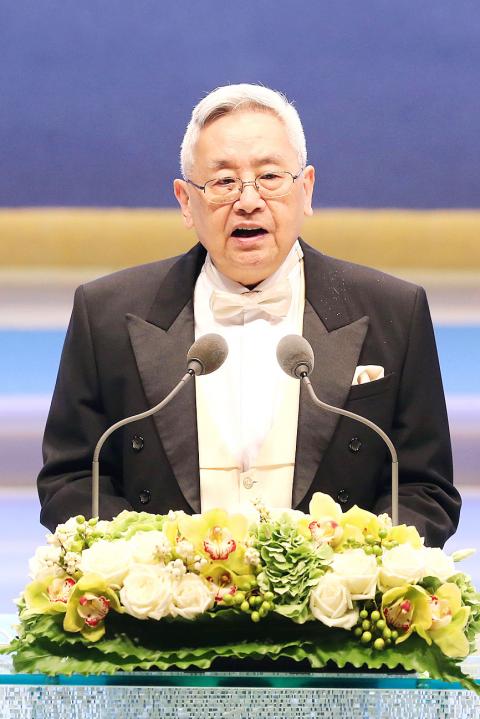Chinese-American historian and Tang Prize laureate Yu Ying-shih (余英時) yesterday reiterated his support for and admiration of Taiwan’s Sunflower movement.
“I was very touched by the Sunflower movement a while ago… the students did not leave the legislature until they thoroughly cleaned up the place and they left peacefully,” the Princeton University emeritus professor said during a talk in Taipei on the importance of cultivating humanistic qualities in modern society.
“It was a remarkable movement,” the 84-year-old China-born academic said.

Photo: CNA
The Sunflower movement refers to student-led protests in March and April this year against the way a trade in services agreement with China was handled by the Chinese Nationalist Party (KMT) government. The protesters occupied the legislature for almost 23 days and at one point stormed the Executive Yuan building, drawing mixed but mostly sympathetic reactions from the media.
In a press conference a day earlier, Yu, although approving of the students’ opposition, stopped short of expressing full support for the demonstrations, saying he is against “violent protests” in a democratic society.
In yesterday’s speech, Yu said that he had no intentions of “appeasing” people or asking them “not to rebel.”
He said citizens in a democratic society should protest and express their dissatisfaction with the government, but in a peaceful way, because if all efforts fail, they can still resist the government with their ballots.
Yu, an outspoken critic of the Chinese government, said Taiwan’s democratization process has great significance in Chinese history because China’s dynastic changes and power shifts have always been compelled by military force.
Taiwan’s democracy broke that cycle of violence and counters the saying that Chinese culture is opposed to the ideas of democracy, freedom and equality, he said.
In fact, he said, the first people who brought the idea of democracy to China were academics influenced by Confucianism, such as Kang Youwei (康有為, 1858-1927) and Yan Fu (嚴復, 1854-1921), proving that traditional Chinese thinking was not against democracy.
The concept of democracy also appears in a book by Chinese scholar Huang Zongxi (黃宗羲, 1610-1695), in which Huang condemned autocratic rule and proposed using schools to hold discussions on public affairs, he said.
Yu is the first winner of the Tang Prize in Sinology. In addition to his scholarly pursuits, Yu is an outspoken supporter of the democracy movement in China and is known to have sheltered young refugees who fled China after the Tiananmen Square Massacre in 1989.

A magnitude 7.0 earthquake struck off Yilan at 11:05pm yesterday, the Central Weather Administration (CWA) said. The epicenter was located at sea, about 32.3km east of Yilan County Hall, at a depth of 72.8km, CWA data showed There were no immediate reports of damage. The intensity of the quake, which gauges the actual effect of a seismic event, measured 4 in Yilan County area on Taiwan’s seven-tier intensity scale, the data showed. It measured 4 in other parts of eastern, northern and central Taiwan as well as Tainan, and 3 in Kaohsiung and Pingtung County, and 2 in Lienchiang and Penghu counties and 1

A car bomb killed a senior Russian general in southern Moscow yesterday morning, the latest high-profile army figure to be blown up in a blast that came just hours after Russian and Ukrainian delegates held separate talks in Miami on a plan to end the war. Kyiv has not commented on the incident, but Russian investigators said they were probing whether the blast was “linked” to “Ukrainian special forces.” The attack was similar to other assassinations of generals and pro-war figures that have either been claimed, or are widely believed to have been orchestrated, by Ukraine. Russian Lieutenant General Fanil Sarvarov, 56, head

SAFETY FIRST: Double the number of police were deployed at the Taipei Marathon, while other cities released plans to bolster public event safety Authorities across Taiwan have stepped up security measures ahead of Christmas and New Year events, following a knife and smoke bomb attack in Taipei on Friday that left four people dead and 11 injured. In a bid to prevent potential copycat incidents, police deployments have been expanded for large gatherings, transport hubs, and other crowded public spaces, according to official statements from police and city authorities. Taipei Mayor Chiang Wan-an (蔣萬安) said the city has “comprehensively raised security readiness” in crowded areas, increased police deployments with armed officers, and intensified patrols during weekends and nighttime hours. For large-scale events, security checkpoints and explosives

‘POLITICAL GAME’: DPP lawmakers said the motion would not meet the legislative threshold needed, and accused the KMT and the TPP of trivializing the Constitution The Legislative Yuan yesterday approved a motion to initiate impeachment proceedings against President William Lai (賴清德), saying he had undermined Taiwan’s constitutional order and democracy. The motion was approved 61-50 by lawmakers from the main opposition Chinese Nationalist Party (KMT) and the smaller Taiwan People’s Party (TPP), who together hold a legislative majority. Under the motion, a roll call vote for impeachment would be held on May 19 next year, after various hearings are held and Lai is given the chance to defend himself. The move came after Lai on Monday last week did not promulgate an amendment passed by the legislature that